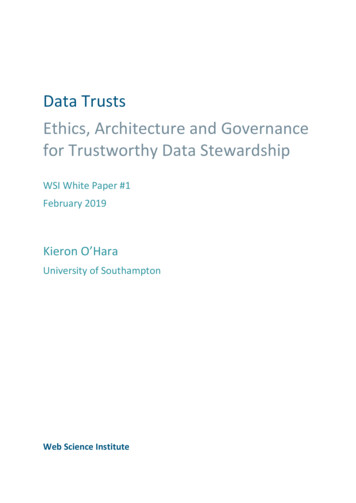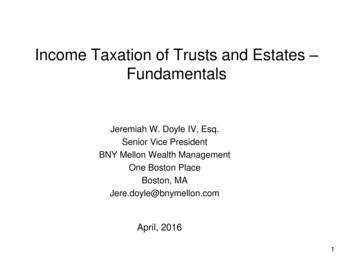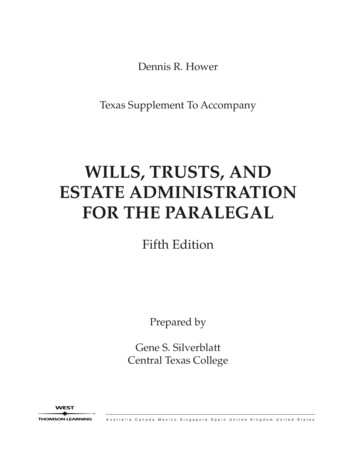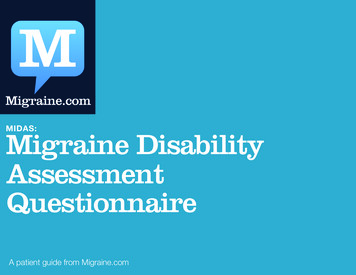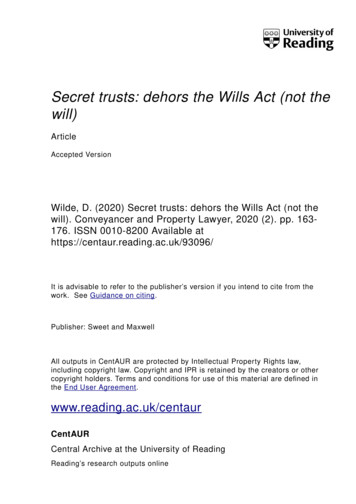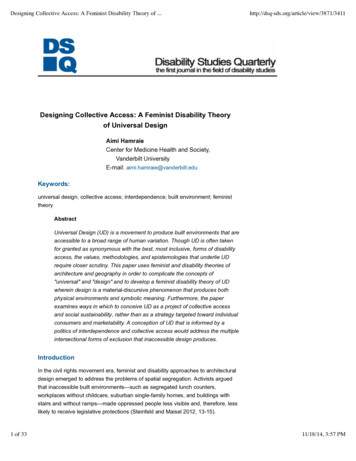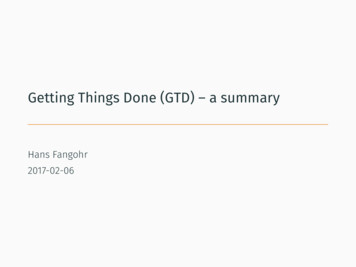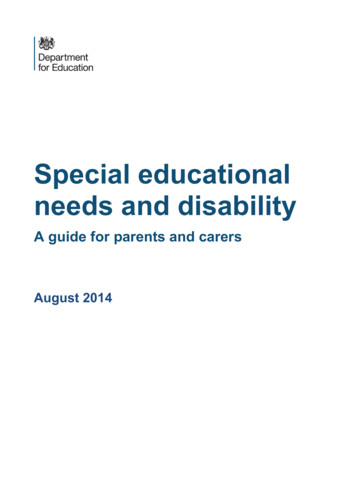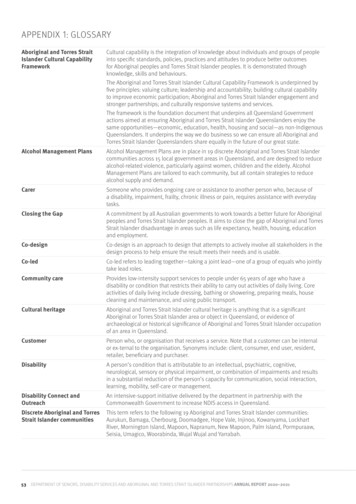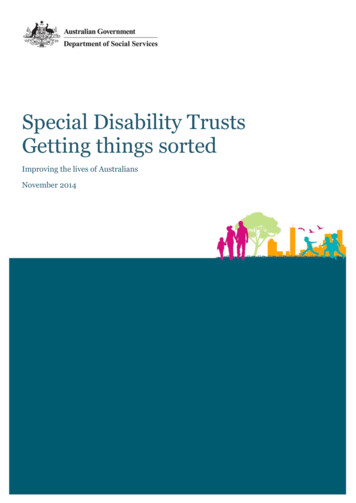
Transcription
Special Disability TrustsGetting things sortedImproving the lives of AustraliansNovember 2014
Special Disability Trusts ― Getting things sorted Commonwealth of Australia 2011ISBN: 978 1 921130 68 7This work is copyright. It may be reproduced in whole or part subject to the inclusion of anacknowledgment of the source and no commercial usage or sale. Reproduction for purposes otherthan those indicated above, require the prior written permission from the Commonwealth availablefrom the Department of Social Services.Requests and inquiries concerning reproduction and rights should be addressed to theDepartment of Social Services, PO Box 7576, Canberra Business Centre, ACT 2610 ordssfeedback@dss.gov.au.Our gratitude goes to the members of the reference group and the family members and serviceproviders who generously provided insight and feedback during the development of the book.This resource was updated in 2011 by the Department of Families, Housing, Community Services andIndigenous Affairs and in 2014 by the Department of Social Services.2 Page
Special Disability Trusts ― Getting things sortedContentsContentsIntroductionWhat is this booklet about?Before using this bookletOutline of this bookletSection 1 – The who’s who and what’s what of trusts and willsWhat do the trustees have to do?What are the rights of the trustees?What rights does the beneficiary have?How are trusts taxed?Are there other costs of maintaining a trust?Section 2 – Special Disability Trusts and social security: the general rules and concessions forSpecial Disability TrustsGeneralConcessions for Special Disability TrustsConcessions for people with severe disabilityConcessions for immediate family members of a person with severe disabilityThe rules for Special Disability Trusts in more detailWho is a person with ‘severe disability’?How many trusts can a beneficiary have?What are reasonable care needs?What are reasonable accommodation needs?Can a beneficiary’s medical needs be met by the trust?What else can the trust pay for?Can the trust pay family members for providing services?Can a third party benefit from Special Disability Trust expenditure?Will any trust qualify as a Special Disability Trust?Who can be a trustee of a Special Disability Trust?Are there any restrictions on what can be gifted to a Special Disability Trust?What happens if someone fails to comply with the rules?What are the taxation requirements of a Special Disability Trust?How is a Special Disability Trust and/or an individual beneficiary’s tax return completed?What happens if a Special Disability Trust ceases to be such a trust?Well, I’ve considered all these rules. Should I set up a Special Disability Trust or not?Section 3 – Final wordsAbout the 1717171819193 Page
Special Disability Trusts ― Getting things sortedIntroductionWhat is this booklet about?Families of people with disability, especially parents, often ask ‘What will happen when I can nolonger provide care?’ It can be hard looking after the interests of a person with disability at any time,but making arrangements for the future can be even harder.This booklet and the Planning for the Future: People with Disability booklet are intended to makethings simpler by explaining the options. This booklet deals briefly with planning for the future takingaccount of disability issues generally and how families can use trusts to help look after familymembers with disability. It also explains how income support (social security and veterans’entitlement) concessions for Special Disability Trusts can help in providing for family members withsevere disability. Note: ‘Special’ refers to the social security and tax treatment of the trust and is not areference to the beneficiary’s disability.Before using this bookletWhether the information about income support in this booklet will apply to you, or to a person withdisability, depends on eligibility for income support from the Department of Human Services or theDepartment of Veterans’ Affairs. Before establishing a Special Disability Trust, you should verify withthe Department of Human Services or the Department of Veterans’ Affairs that the person for whomthe trust is being established meets the definition of ‘severe disability’ under Section 1209M of theSocial Security Act 1991. Where the person with disability does not meet the definition of ‘severedisability’, a Special Disability Trust cannot be established.This booklet builds on the information in Planning for the Future: People with Disability. You shouldread this booklet first as it will: examine options in relation to estate planning and providing for the future of a person with highsupport needs, including how to begin the process of planning for the future and how to implementthat plan; explore issues that may arise both for individuals and families when deciding how to put the planinto action, including how to get legal and financial advice; provide information on how guardianship, accommodation and care options affect what you can do;and identify supports and contacts for obtaining further information.This booklet only gives general information. How this affects you depends on your own situation.Which parts of it are most applicable or important will differ substantially from family to family. Everyperson with severe disability has different levels of ability which should be taken into account. Theresources available, and the opinions of family members and of the person with the disability, willdiffer from case to case.You should not copy the Special Disability Trust, Model Trust Deed without getting specialist legal,accounting or financial planning advice. The use of a Special Disability Trust should be part of a wellconsidered estate plan for the family, and particularly for the person with severe disability.Outline of this bookletSection 1, The who’s who and what’s what of trusts and wills, looks at some of the expressionsused when talking about trusts and wills, and what they mean. It also briefly looks at how a trustoperates, from the point of view of the trustee and of the person with the disability, and some of thelegal and accounting requirements, reporting obligations and tax issues connected to trusts.Section 2, Special Disability Trusts and social security, deals with how the income test and theasset test (which apply where there are entitlements to social security or veterans’ entitlementspayments) apply to trusts, and details the concessions arising from the Government’s initiative onSpecial Disability Trusts.4 Page
Special Disability Trusts ― Getting things sortedWho should read this booklet?Because the issues discussed in this booklet are most often relevant to parents of a person withsevere disability, the ‘you’ referred to in the booklet is primarily a parent. However, the sameprinciples apply to other family members or friends considering providing benefits to a person withsevere disability.Questions and answersThe questions asked in this book are the questions parents and other family members most often askwhen talking about estate planning where one of the people involved is with disability. Acomprehensive list of Questions and Answers regarding Special Disability Trusts can be found on theDepartment of Social Services website.‘Disability’ and ‘severe disability’Because the income support concessions relate to providing for people with severe disability asdefined in this context (see page 15), this term occurs often in this booklet.However, even where the disability is not severe in terms of the definition in legislation, a lot of thesame issues have to be considered by parents or others considering setting up a trust, or a will, asestate planning methods.Some people with disability are quite capable of handling their own financial affairs, care andaccommodation without assistance, so there may not be any need to go into the things discussed inthis booklet.Income support, social security and veterans’ entitlementsWhen discussing the concessions, this booklet sometimes mentions ‘income support’. The rules applyequally to benefits administered by the Department of Veterans' Affairs and by the Department ofHuman Services. However, to simplify the explanations, the booklet mainly talks about incomesupport, using that expression to cover both social security administered by the Department of HumanServices and veterans’ entitlements administered by the Department of Veterans’ Affairs.‘Property’ and ‘money’ and ‘assets’In this booklet, the property of people or trusts will be referred to as their ‘assets’ or ‘property’.‘Property’ used in this way does not mean only land or real estate, it includes money, shares or anyother type of asset.Trusts and wills: making arrangements while you are alive or after you dieThis booklet focuses on trusts because the income support concessions work through a trustmechanism. You can set up a trust while you are alive, or you can set up a trust through your will, totake effect after you die. The legal rules which apply, and the considerations you need to take intoaccount, are the same whether the trust is set up while you are alive or through your will.This is explained in more detail in the Planning for the Future: People with Disability booklet.5 Page
Special Disability Trusts ― Getting things sortedSection 1 – The who’s who and what’s what of trusts and willsA trust is a legal relationship between a trustee, who looks after or administers the trust, and abeneficiary, the person who benefits from the trust. The nature of a trust is a legal obligation on thetrustee to look after the trust property, and invest it and use it wisely and carefully for the benefit of thebeneficiary. The beneficiary has the right to receive benefits from the trust as required by the terms ofthe trust and some rights to information about the trust and how the trustee is operating it.The terms of the sort of trust being discussed here would usually be set out in a document such as atrust deed or a will.A trust deed may be simple or complex, depending on what is needed. It is a legal document whichsets out: who is to be a trustee; the person or people who are to be the beneficiaries; when and how the trustee is to provide benefits to the beneficiary; what things the trustee is to take into account; and what other powers and duties the trustee has.The person who sets up a trust by a deed is usually called the settlor. For tax reasons, the settlor isoften an unrelated party or a more distant family member who will not be a beneficiary and who hasnothing else to do with the trust.In trusts for the benefit of a person with severe disability, that person may be called the principalbeneficiary or the special or prime beneficiary or beneficiary. Other beneficiaries, who are entitledto share what is left after the person with severe disability has died or no longer needs help from thetrust, are often called the residuary beneficiaries.A trust deed may also name an appointor, a person who is separate from the trustee and who canappoint new trustees or beneficiaries, or make changes to the terms of the trust, and who thereforeoften has significant control over the trust. The appointor will often be a parent or other close relativeof the person with severe disability, who has contributed property to the trust.The property contributed to the trust is often called the capital and the trust earns income on thatcapital: rent on real estate, interest on money in the bank, dividends on shares, and so on.A discretionary trust gives the trustee the power to decide to whom to pay a benefit out of a range ofpeople, and how much to give to them, if anything.A testamentary trust means any trust set up under a will. However, people often use this term torefer more specifically to particular types of trusts under wills which may have tax planningadvantages.The person making a will is called the testator (this covers men and women although a womanmaking a will is sometimes called the testatrix). A will appoints an executor (sometimes said to bean executrix if a woman), or a number of executors, to put the will into effect after the testator dies.If the will creates a trust, it will also appoint a trustee, who may be the same person as the executor,or may be different.The property owned by the testator at the time of death is the testator’s estate. The people who sharein the estate under the will are called the beneficiaries.What do the trustees have to do?The essential relationship involved in a trust is the responsibility of the trustee to act in the interests ofthe beneficiary in accordance with the terms of the trust.6 Page
Special Disability Trusts ― Getting things sortedIf the trust is discretionary, it is up to the trustee to decide whether to do anything and, if so, what todo, and it is not generally possible to compel the trustee to act in a particular way. You can control thisto some extent through provisions in the trust deed or will. Also see the Planning for the Future:People with Disability booklet.In brief, the duties of the trustee are: to implement the trust in accordance with its terms; to consider whether to spend trust money or otherwise use the trust property for the benefit of thebeneficiary, with reasonable frequency; to invest trust property prudently and in accordance with the directions contained in the trust; to avoid unnecessary expense or waste of trust property; to take professional advice (legal, financial, accounting, medical or other advice) if required (at theexpense of the trust); to keep accounts of assets and liabilities and income and expenditure and be ready to account tothe beneficiary if required; and if the trust is relevant to the income support entitlements of the beneficiary, to provide information tothe Department of Human Services or the Department of Veterans’ Affairs as required.What are the rights of the trustees?Trustees have the right: to have their reasonable trust-related expenses paid from the trust; to ask the Supreme Court to give advice and directions, if they have a serious doubt as to what theyare entitled to do: for example, if there is ambiguity in the way the trust deed is expressed, or ifdifficult choices arise which might result in a breach of trust, or if the trust seems to requiresomething unusual or odd; to recompense from the trust for the work they do, if the trust deed or will provides for pay for thetrustee (but not in a Special Disability Trust if the trustee is an immediate family member: seepage 15). It may be very reasonable to provide for payment to trustees, because the trustees havea lot of responsibility and may have to spend a lot of time and effort deciding what to do in the bestinterests of the person with severe disability; and to appoint additional or replacement trustees to take over the role of trusteeship if the originaltrustees cannot continue.Many of the rights and obligations of trustees are regulated by state-based legislation.What rights does the beneficiary have?Beneficiaries essentially have the right to have the trust administered in accordance with its terms andthe right to call trustees to account.The beneficiary can express his or her wishes and ask the trustee for assistance but cannot compel atrustee to act in a particular way unless the trust deed or the will allows this.Beneficiaries are entitled to require an accounting from the trustees, but are generally not entitled toan account of the trustees’ reasons for making a decision in one way or another. If the beneficiarybelieves that the trust has not been properly implemented, the beneficiary can apply to the court forassistance (although this is always expensive and should be avoided wherever possible).A beneficiary with disability may need help to do this.Otherwise, the beneficiary can expect to benefit from the assets in the trust, but the trustee may wellhave to balance short and long term considerations, especially in a trust which may last for manyyears. It may not be a wise thing to spend all of the money of the trust on something now, eventhough it seems a good thing to do, if this will leave the trustee without any resources in the future.7 Page
Special Disability Trusts ― Getting things sortedExampleDavid has a physical disability which is expected to become more severe as he gets older. He has atrust of which his brother Michael is the sole trustee. The trust owns the house in which David lives,and David wants to modernise part of the house.Michael agrees modernising the house would be a good thing because it would make the house moreattractive and comfortable. However, he is concerned that if money is spent on renovations now,there will not be sufficient money available later when they might need to modify the housesubstantially so David can continue living there.Michael decides, as trustee, not to renovate, and this is within his powers as trustee as set out in thetrust deed, and is consistent with the principle of acting in the best interests of the beneficiary.How are trusts taxed?As a trust is treated as a separate legal structure for tax purposes, it has its own tax responsibilities.Trustees have an obligation to submit tax returns and pay tax as required. The trustee is entitled topay tax from the trust assets. Sometimes it is the trust which will have to pay tax on income.Sometimes tax is payable by the beneficiary who receives income. These issues are complex, andwill not be covered here. If you need advice on taxation issues, seek professional advice.Trusts are not entitled to the tax-free threshold available to individuals, and higher rates of tax (themaximum personal tax rate) may apply to income retained by trusts (that is, income not distributed toor used for a beneficiary). However, a trust created by a will which is a ‘genuine testamentary trustof a traditional kind’ may be subject to the ordinary personal rates of tax.This booklet does not go into the pros and cons of different structures for tax purposes. Thatis a matter for specialist legal and financial advice.Special Disability Trusts have beneficial taxation measures: the unexpended income of a Special Disability Trust is taxed at the beneficiary’s personal incometax rate, rather than the highest marginal tax rate; provide a capital gains tax exemption for any asset donated to a Special Disability Trust; provide a capital gains tax exemption for the recipient of the beneficiary’s main residence, ifdisposed of within two years of the beneficiary’s death; and ensure equivalent taxation treatment amongst Special Disability Trusts established under differentActs.Special Disability Trusts can also be set up through your will. This may involve costs, which youshould consider carefully before setting up the trust.Are there other costs of maintaining a trust?If the trustee uses an accountant to prepare accounts and tax returns, there will be fees for that work.If the trustee is a company, there will also be legal and accounting fees associated with setting up andmaintaining the company.These sorts of expenses, and the legal and other fees of setting up trusts, are something you shouldconsider with your professional advisers before deciding whether to set up a trust now, or throughyour will, or at all; what assets to place in trust; and when to do so.Note: A settlor cannot be a trustee or have anything to do with the trust.Further detailed information on trusts is contained in the Planning for the Future: People withDisability booklet.8 Page
Special Disability Trusts ― Getting things sortedSection 2 – Special Disability Trusts and social security:general rules and concessionsGeneralAustralia’s social security system is based on need and is designed to be a safety net for people whoare unable to support themselves. To ensure the system provides help where it is most needed, thereis a means test which has two components: the income test and assets test.The amount of income support payable to a recipient is calculated under both the income and assetstests. The test that results in the lower rate of income support is the one that is applied.Under the means test, there are special rules for the treatment of gifts made to third parties andprivate trusts and companies.These rules can be complex, depending on your circumstances. You should get financial andlegal advice about how the rules may affect you or any trust you have or intend to set up.For more information, including payment rates, please contact your nearest Centrelink CustomerService Centre or Department of Veterans’ Affairs office. This information can also be found online atDepartment of Human Services and Department of Veterans' Affairs.Concessions for Special Disability TrustsLegislation concerning Special Disability Trusts is intended to reduce the impact of the rules applyingto trusts and encourage families who wish to make their own arrangements for family members withsevere disability. The general thrust of the Special Disability Trust legislation is to create exceptions tothe ordinary means test rules applying to trusts for a person with severe disability.These are potentially significant concessions where family members and people with severe disabilityrely (or may rely in the near future) on social security or veterans’ affairs entitlements, or wouldpotentially qualify for income support if they transferred funds to a Special Disability Trust.However, for these concessions to be available, the trust must adhere strictly to the rules for SpecialDisability Trusts, and the rest of this section explains how those rules operate. Most importantly, thetrust must be established for the primary and other purposes outlined in legislation which includesproviding care and accommodation for a person with severe disability. The initial step should be toverify with the Department of Human Services or the Department of Veterans’ Affairs that the personfor whom the trust is being established meets the definition of ‘severe disability’ under section 1209Mof the Social Security Act 1991 before establishing a Special Disability Trust.Concessions for people with severe disabilityIncome test Income from the assets of a Special Disability Trust will not be counted for the application of theincome test to the beneficiary of the trust. The use of money from the trust to pay for care, accommodation, maintenance of trust assets anddiscretionary spending for the person with severe disability will not be counted as that person’sincome for income support purposes.Assets test If a person with severe disability is the beneficiary of a Special Disability Trust, the assessableassets of that trust up to 626,000 (as at 1 July 2014 indexed annually) will be disregarded for theapplication of the assets test. This means that it will not affect the income support entitlements ofthe person with severe disability. For the meaning of ‘assessable assets’, see general assets testrules at the Department of Human Services and the Department of Veterans’ Affairs or contact yournearest Centrelink Customer Service Centre or a Department of Veterans’ Affairs office.9 Page
Special Disability Trusts ― Getting things sorted As the principal home of the person with severe disability would also be disregarded, this meansthat the Special Disability Trust could have assessable assets of up to 626,000 (as at 1 July 2014)plus the home in which the person with severe disability lives before the excess assets areincluded in the beneficiary’s assessable assets.ExampleA Special Disability Trust has 800,000 in assets plus a home for the beneficiary with severe disabilityCarol, as at 1 January 2014. The assets to which the assets test applies will be the ‘excess’ above theassets test concession (which is 626,000 as at 1 July 2014): that is, 174,000 after the home and 626,000 assets test concession are disregarded. Carol is assessed as a single homeowner for thepurposes of the means test. Depending on Carol’s other assessable income and assets, Carol’sincome support payments may be reduced. The assets test concession for Special Disability Trusts, initially set at 500,000 on 20 September2006 and indexed annually, applies at any point in time, so if assets are spent and the trust istopped up, the concession still applies up to the limit. As at 1 July 2014 the asset test concession is 626,000. As the assets test concession is indexed, the amount the trust can hold without affecting the incomesupport payments of a person with severe disability will change annually.ExampleA Special Disability Trust has 500,000 at 20 September 2006. On 1 July 2007, the assets testconcession is increased by indexation to 516,500. The trust has earned income of 20,000 andspent 15,000, so the assets held in the trust on 1 July 2007 are worth 505,000. Because theassessable assets are less than the 516,500 indexed limit, none of the trust’s assets are assessedunder the assets test.Concessions for immediate family members of a person with severe disabilityGifting concessions Anyone can give to the Special Disability Trust. However, the principal beneficiary that is the personwith disability and their partner can only do so if the gift is funded by:-assets the principal beneficiary received under a will; ora superannuation death benefit received by the principal beneficiary;and the funds are transferred to the trust within three years of their receipt by the principal beneficiary. Any gift to the trust, whether it is from an immediate family member or any other person, must beunconditional and made without expectation of receiving any payment or benefit in return. The gifting concession is only available to an immediate family member who:-receives a social security pension and has reached age pension age; or-receives a service pension and has reached the veterans’ pension age; or-receives a veterans’ income support supplement and has reached the qualifying age for thepayment. ‘Immediate family members’ of the person with severe disability are:-parents (including adoptive and step parents);-legal guardians of a person with severe disability who is less than 18 years old, and people whowere legal guardians when the person with severe disability was less than 18 years old;-grandparents; and-brothers and sisters (including adoptive and step brothers and sisters and half brothers andsisters).The gifting concession applies to gifts up to 500,000 per trust (which is not subject to indexation).10 P a g e
Special Disability Trusts ― Getting things sorted To use the concession, you must be an immediate family member who is receiving a qualifyingpayment and inform the Department of Human Services or the Department of Veterans’ Affairs ofyour intention to use the concession. Where the concession has been fully used, additionalcontributions by immediate family members will be assessed under the normal gifting rules. Gifts from people who are not immediate family members, or gifts in excess of the giftingconcession from immediate family members, are assessed under the normal gifting rules.ExampleThis concessional amount of 500,000 can only be used once. For example, if an eligible contributorgifts to a Special Disability Trust and receives a concession, then dies, their concession amountcannot be accessed by any other immediate family member. Or if an eligible contributor is of pensionage or receiving a pension and gifts 400,000 and receives the gifting concession, then anothereligible contributor who receives a pension or reaches pension age gifts 200,000 they can onlyreceive 100,000 as a gifting concession.ExampleDavid has a Special Disability Trust. His parents Paul and Lucy are both receiving the Age Pension.When the trust was established in 2006, they contributed 300,000 to the trust. By 2012, most of thefunds had been spent on care and accommodation, and Paul and Lucy contributed a further 300,000to the trust. The gifting concession will apply to the first contribution and to 200,000 of the secondcontribution. Therefore, the normal gifting rules will apply to the excess of 100,000.An immediate family member who is not of qualifying age (and whose partner is not of qualifying age)can make contributions to a Special Disability Trust and take advantage of the concession later, whenhe or she reaches qualifying age, providing the gifting concession has not been fully used. Thismeans that it is possible to put assets in the trust up to five years before claiming the Age Pension orrelevant veterans’ entitlement, and still have the assets disregarded for means test purposes whenyou receive income support. Where you are already receiving income support before reachingqualifying age, the gift will be counted under the normal gifting rules until you reach qualifying age.ExampleGreg has severe disability and his father John, aged 58, established a Special Disability Trust for him.On 1 October 2006, John gave 500,000 to the trust. John could not apply to Centrelink for the giftingconcession as he was below Age Pension age.On 1 June 2011, John gave another 500,000 to the trust. The trust has not received any othercontributions since John’s initial contribution in 2006.In 2013, John turned 65 and applied for Age Pension. John’s gift in 2006 is disregarded because itwas more than five years prior to his claim for Age Pension. His gift in 2011 is within five years of hisclaim, and as he is an immediate family member his gift is eligible for the gifting concession.Therefore his gift in 2011 is disregarded for social security means test purposes.ExampleA variation of the above example: in 2012, Greg’s grandmother Marie puts 200,000 into Greg’s trust.Marie is currently receiving the Age Pension. As Marie is an immediate family member, her gift iseligible for the gifting concession. Marie receives the gifting co
the trust and some rights to information about the trust and how the trustee is operating it. The terms of the sort of trust being discussed here would usually be set out in a document such as a trust deed or a will. A trust deed may be simple or complex, depending on what is needed. It is a legal document which

